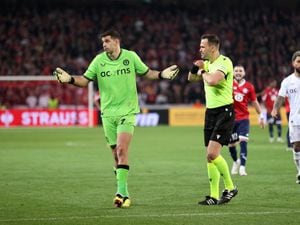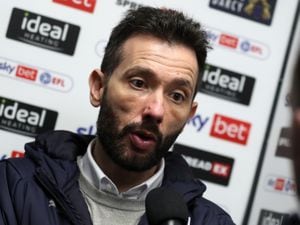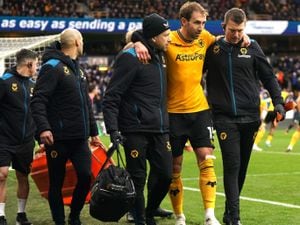Matt Maher: Owners are proving to be the dream ticket at Wolves
The past week saw the anniversary of two very different takeovers which altered the landscape of West Midlands football and may continue doing so for some time yet.
While Monday marked two years since billionaire duo Nassef Sawiris and Wes Edens rode in at the 11th hour to rescue Villa from the jaws of administration, Tuesday saw Fosun celebrate four years at the helm of Wolves.
Theirs has unquestionably been the biggest impact, transforming a club which had spent the majority of the previous three decades in the second tier into one now threatening to break into the Premier League’s elite.
Win at Chelsea on Sunday and Wolves will be guaranteed their highest league finish for 40 years together with qualification for the Europa League for the second season running.
Next month, meanwhile, has the potential to be among the most momentous in the club’s history. Overcome Olympiacos in the second leg of their Europa League last-16 tie and Wolves will be just three wins away from the Champions League.
The transformation since 2016, when Jeff Shi sat in the Sir Jack Hayward Suite and spoke of bringing back the glory days of the 1950s, has been nothing short of remarkable, perhaps made even more impressive by the fact things did not initially go to plan.
Indeed, the first year of Fosun’s ownership often appeared chaotic, from Walter Zenga’s appointment and brief reign, through the apparent 180 degree turn to Paul Lambert and a raft of signings, the vast majority of whom made little to no impact.

Jorge Mendes’ presence prompted fears the club was simply going to become a showcase for players – good, bad or indifferent.
Nuno Espirito Santo’s arrival in the summer of 2017 changed all that. There can be no question since then Wolves have felt the benefit of those Mendes links, while Fosun swiftly demonstrated an ability to learn from the mistakes of their opening 12 months. The only way has been up and crucially, not just on the pitch.
Fosun are a huge conglomerate of which Wolves are only one part, yet any concerns there might be a disconnect between China and the club have proven misplaced. Shi now lives in the city and has taken an increasingly hands-on role, while the fact Fosun are invested not just in Wolves but also the community was further demonstrated by their work during the pandemic, when more than 40,000 surgical face masks were delivered from China to New Cross Hospital.
Just like Fosun have embraced Wolves’ tradition, so Sawiris and Edens have been respectful of Villa’s history since helping to alter the course of it two years ago.
Their impact on the club’s fortunes has been similarly significant though perhaps less obvious considering Villa still find themselves trailing Wolves by a distance on the pitch.
Yet without their intervention, it is likely the gap would have been even wider. In the weeks before their takeover, Villa were in the grip of a financial meltdown and on the brink of entering administration, which meant they would have started the 2018/19 season on -12 points.
Sawiris and Edens brought instant financial stability, their considerable wealth allowing Villa to fend off the advances of Tottenham toward Jack Grealish, the player who less than a year later would lead his boyhood club to promotion.
Their investment in the club is now thought to top £250million and similar to Fosun, it has not all been spent on players. Improving Villa’s infrastructure has been key, from the academy to the training ground, while Villa Park, like Molineux, has been given a dose of cosmetics where required. When building a culture, the little things do add up.
Still, this is sport and success on the pitch remains the priority. Villa spent £140million during the last two transfer windows and we will not know until Sunday whether even that was enough to keep the club in the Premier League. Sawiris and Edens would have been prepared to spend even more had it not been for the league’s profit and sustainability rules.
The regulations require clubs to focus on strategic growth, something Wolves have achieved with great success to this point. In order to compete in the Europa League, they have also been required to comply with UEFA’s Financial Fair Play guidelines, which are considerably stricter than the Premier League.
If there is a frustration, it is that a pair of Midlands clubs have been acquired by two of the wealthiest ownership groups in English football, at a time when the rules make breaking into the elite harder than ever.
Manchester City’s recent victory at the Court of Arbitration for Sport might have been a blow for UEFA but the common view is it will not represent the end of FFP as we know it.
“I don’t think UEFA have any intention of scrapping it,” explains Dan Plumley, senior lecturer on sport finance at Sheffield Hallam University. “They would say that overall FFP has had a good impact on regulating club finances across Europe.
“The flip side of the argument is that it has strengthened the position of the clubs at the top, who qualify for the Champions League year-in, year-out.
“What Wolves have done is phenomenal. But the next step, breaking into the top four, is very difficult.”
Difficult, perhaps. But after four years of Fosun, Wolves are once again a club which dares to dream.





